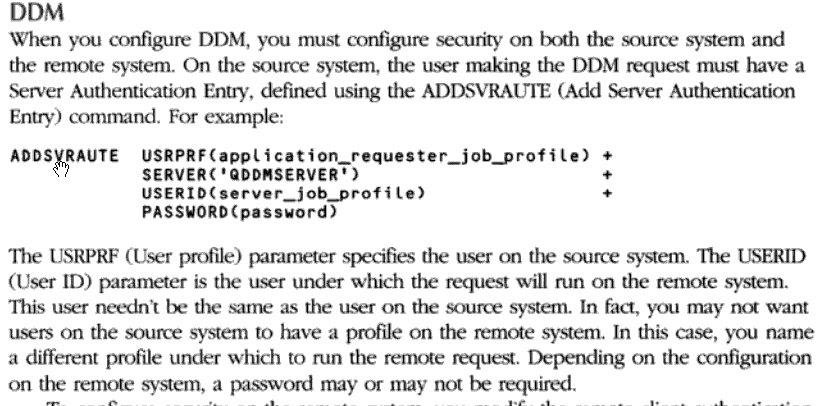HOWTO:TroubleShooting
Troubleshooting
How to get the Bundle States
Open the OSGi console and type:
osgi> ss remain
Copy the resulting list and attach it to the helpdesk item.
How to set-up DDM to view TD/OMS log on remote machines
When you use command DSPLOGOMS to view a log from a remote machine, TD/OMS creates a DDM file to so. If this fails you must do some additional set-up to make this work.
Check if DDM server is running
The TCP server for DDM must be running. Use command STRTCPSVR SERVER(*DDM) to start the server.
Check the DDM TCP/IP attributes
Use command CHGDDMTCPA to check what the DDM TCP/IP attributes settings are. When "Lowest authentication method" is set to "*USRIDPWD" or higher value then it is required to have a Server Authentication Entry for each user who has to have access to the remote address. Use command DSPSVRAUTE to display the existing authentication entries.
Add server entry for user
To add an Authentication entry use command:
More info about TCP/IP DDM set-up
Check the TD/OMS log file values
You can only view a log from a remote machine when the log file (OMLOG) on both systems have:
- The same record id (Use DSPFD to check this) - The same CCSID (Use DSPFFD and make sure that the first field has CCSID 37)
How to gather TD/OMS logging information
TD/OMS logging information can be gathered through the DSPLOGOMS command. More information on how to use the command can be found in:
How to set the GUI logging level
If you want to investigate some TD/OMS behavior you are able to increase the logging level in the GUI. You can find the logging level in the preferences.
How to access the GUI log
If you want to investigate some TD/OMS behavior you can take a look at the GUI console log.
In addition, you can find GUI logs in the Error Log View.
How to set the server logging level
Problems may also occur on the IBM i. You can use the DSPLOGOMS function nut also the job logs of the server jobs. To force additional logging you may set the logging level of the IBM i with the STRSD command.
If you set the logging level to 1=Trace, every call from the GUI to the server will generate a joblog. The joblog appears under the user that calls the GUI jobs.


